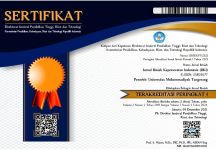Correlation between Self-Efficacy on Diabetes Self-Management in Middle Age with Type 2 Diabetes Mellitus
Abstract
Full Text:
PDFReferences
Alhaik, S., Anshasi, H. A., Alkhawaldeh, J., Soh, K. L., & Naji, A. M. (2019). An assessment of self-care knowledge among patients with diabetes mellitus. Diabetes & Metabolic Syndrome: Clinical Research & Reviews, 13(1), 390–394.
Alzahrani, A., Alghamdi, A., Alqarni, T., Alshareef, R., & Alzahrani, A. (2019). Prevalence and predictors of depression, anxiety, and stress symptoms among patients with type II diabetes attending primary healthcare centers in the western region of Saudi Arabia: a cross-sectional study. International Journal of Mental Health Systems, 13(1), 1–7.
Beverly, E. A., Ritholz, M. D., Shepherd, C., & Weinger, K. (2016). The psychosocial challenges and care of older adults with diabetes:“Can’t do what I used to do; can’t be who I once was.” Current Diabetes Reports, 16, 1–12.
Borba, A. K. de O. T., Arruda, I. K. G., Marques, A. P. de O., Leal, M. C. C., & Diniz, A. da S. (2019). Knowledge and attitude about diabetes self-care of older adults in primary health care. Ciencia & Saude Coletiva, 24, 125–136.
Gloria-Bottini, F., Antonacci, E., Neri, A., Magrini, A., & Bottini, E. (2019). Is there a relationship between stature and age of onset of type 2 Diabetes? Diabetes & Metabolic Syndrome: Clinical Research & Reviews, 13(1), 270–271.
IDF. (2018). Diabetes risk factors. International Diabetes Federation. https://www.idf.org/aboutdiabetes/what-is-diabetes/risk-factors.html
International Diabetes Federation. (2017). IDF Diabetes Atlas, 8th edition. In IDF Diabetes Atlas (8th ed.). https://doi.org/http://dx.doi. org/10.1016/S0140-6736(16)31679-8.
Jiang, X., Jiang, H., Li, M., Lu, Y., Liu, K., & Sun, X. (2019). The mediating role of self‐efficacy in shaping self‐management behaviors among adults with type 2 Diabetes. Worldviews on Evidence‐Based Nursing, 16(2), 151–160.
Kav, S., Yilmaz, A. A., Bulut, Y., & Dogan, N. (2017). Self-efficacy, depression and self-care activities of people with type 2 diabetes in Turkey. Collegian, 24(1), 27–35.
Kim, M. Y., & Lee, E. J. (2019). Factors affecting self-care behavior levels among elderly patients with type 2 diabetes: A quantile regression approach. Medicina, 55(7), 340.
Lewis, S. L., Dirksen, S. R., Heitkemper, M. M., Bucher, L., & Harding, M. M. (2014). Medical-Surgical Nursing Assessment and Management of Clinical Problems (9th Ed.). Elsevier Inc.
Lin, K., Park, C., Li, M., Wang, X., Li, X., Li, W., & Quinn, L. (2017). Effects of depression, diabetes distress, diabetes self-efficacy, and diabetes self-management on glycemic control among Chinese population with type 2 diabetes mellitus. Diabetes Research and Clinical Practice, 131, 179–186.
Miles, S. R., Khambaty, T., Petersen, N. J., Naik, A. D., & Cully, J. A. (2018). The role of affect and coping in diabetes self-management in rural adults with uncontrolled diabetes and depressive symptoms. Journal of Clinical Psychology in Medical Settings, 25, 55–65.
Mohan, V., Mapari, J. A., Karnad, P. D., Mann, J. S., & Maheshwari, V. K. (2018). Reduced diabetes mellitus-related comorbidities by regular self-monitoring of blood glucose: Economic and quality of life implications. Indian Journal of Endocrinology and Metabolism, 22(4), 461.
Ncube, N. (2019). The Impact of Diabetes Mellitus II on Longevity and Morbidity Risk.
Pamungkas, R. A., & Chamroonsawasdi, K. (2020). Self-management based coaching program to improve diabetes mellitus self-management practice and metabolic markers among uncontrolled type 2 diabetes mellitus in Indonesia: A quasi-experimental study. Diabetes & Metabolic Syndrome: Clinical Research & Reviews, 14(1), 53–61.
Rashid, A. A., Zuhra, H., & Tan, C. E. (2018). Social support, self-efficacy and their correlation among patients with Type 2 Diabetes Mellitus: A primary care perspective. The Medical Journal of Malaysia, 73(4), 197–201.
Romakin, P., & Mohammadnezhad, M. (2019). Patient-related factors associated with poor glycaemic control among patients with type 2 diabetes mellitus. Australian Journal of General Practice, 48(8), 557–563.
Saad, A. M. J., Younes, Z. M. H., Ahmed, H., Brown, J. A., Al Owesie, R. M., & Hassoun, A. A. K. (2018). Self-efficacy, self-care and glycemic control in Saudi Arabian patients with type 2 diabetes mellitus: A cross-sectional survey. Diabetes Research and Clinical Practice, 137, 28–36.
Tan, M. L., Manski-Nankervis, J.-A., Thuraisingam, S., Jenkins, A., O’Neal, D., & Furler, J. (2018). Socioeconomic status and time in glucose target range in people with type 2 diabetes: a baseline analysis of the GP-OSMOTIC study. BMC Endocrine Disorders, 18(1), 1–7.
Tharek, Z., Ramli, A. S., Whitford, D. L., Ismail, Z., Mohd Zulkifli, M., Ahmad Sharoni, S. K., Shafie, A. A., & Jayaraman, T. (2018). Relationship between self-efficacy, self-care behaviour and glycaemic control among patients with type 2 diabetes mellitus in the Malaysian primary care setting. BMC Family Practice, 19(1), 1–10.
Thojampa, S. (2019). Knowledge and self-care management of the uncontrolled diabetes patients. International Journal of Africa Nursing Sciences, 10, 1–5.
Trexler, A. J., & Taraska, J. W. (2017). Regulation of insulin exocytosis by calcium-dependent protein kinase C in beta cells. Cell Calcium, 67, 1–10.
Wang, Q., Zhang, X., Fang, L., Guan, Q., Guan, L., & Li, Q. (2018). Prevalence, awareness, treatment and control of diabetes mellitus among middle-aged and elderly people in a rural Chinese population: A cross-sectional study. PloS One, 13(6), e0198343.
Widodo, F. Y. (2014). Pemantauan penderita diabetes mellitus. Ilmiah Kedokteran, 3(2), 55–69.
World Health Organization. (2016). GLOBAL REPORT ON DIABETES. http://www.who.int
DOI: http://dx.doi.org/10.31000/jiki.v7i2.11547
Article Metrics
Abstract - 932 PDF - 2401DOI (PDF): http://dx.doi.org/10.31000/jiki.v7i2.11547.g5433
Refbacks
- There are currently no refbacks.
Copyright (c) 2024 Sucipto Dwitanta
JIKI: Jurnal Ilmiah Keperawatan Indonesia a Creative Commons Attribution-ShareAlike 4.0 International License. © View My Stats







